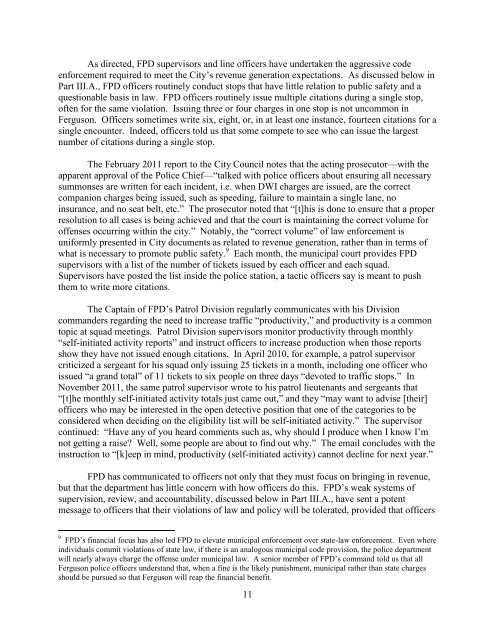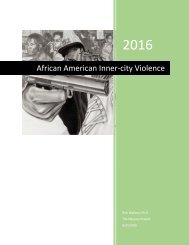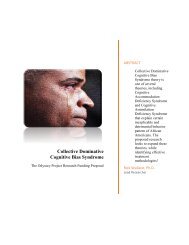U.S. Justice Department Report on the Ferguson Police Department
Ferguson’s law enforcement practices are shaped by the City’s focus on revenue rather than by public safety needs. This emphasis on revenue has compromised the institutional character of Ferguson’s police department, contributing to a pattern of unconstitutional policing, and has also shaped its municipal court, leading to procedures that raise due process concerns and inflict unnecessary harm on members of the Ferguson community.
Ferguson’s law enforcement practices are shaped by the City’s focus on revenue rather than by public safety needs. This emphasis on revenue has compromised the institutional character of Ferguson’s police department, contributing to a pattern of unconstitutional policing, and has also shaped its municipal court, leading to procedures that raise due process concerns and inflict unnecessary harm on members of the Ferguson community.
You also want an ePaper? Increase the reach of your titles
YUMPU automatically turns print PDFs into web optimized ePapers that Google loves.
As directed, FPD supervisors and line officers have undertaken <strong>the</strong> aggressive code<br />
enforcement required to meet <strong>the</strong> City’s revenue generati<strong>on</strong> expectati<strong>on</strong>s. As discussed below in<br />
Part III.A., FPD officers routinely c<strong>on</strong>duct stops that have little relati<strong>on</strong> to public safety and a<br />
questi<strong>on</strong>able basis in law. FPD officers routinely issue multiple citati<strong>on</strong>s during a single stop,<br />
often for <strong>the</strong> same violati<strong>on</strong>. Issuing three or four charges in <strong>on</strong>e stop is not uncomm<strong>on</strong> in<br />
Fergus<strong>on</strong>. Officers sometimes write six, eight, or, in at least <strong>on</strong>e instance, fourteen citati<strong>on</strong>s for a<br />
single encounter. Indeed, officers told us that some compete to see who can issue <strong>the</strong> largest<br />
number of citati<strong>on</strong>s during a single stop.<br />
The February 2011 report to <strong>the</strong> City Council notes that <strong>the</strong> acting prosecutor—with <strong>the</strong><br />
apparent approval of <strong>the</strong> <strong>Police</strong> Chief—“talked with police officers about ensuring all necessary<br />
summ<strong>on</strong>ses are written for each incident, i.e. when DWI charges are issued, are <strong>the</strong> correct<br />
compani<strong>on</strong> charges being issued, such as speeding, failure to maintain a single lane, no<br />
insurance, and no seat belt, etc.” The prosecutor noted that “[t]his is d<strong>on</strong>e to ensure that a proper<br />
resoluti<strong>on</strong> to all cases is being achieved and that <strong>the</strong> court is maintaining <strong>the</strong> correct volume for<br />
offenses occurring within <strong>the</strong> city.” Notably, <strong>the</strong> “correct volume” of law enforcement is<br />
uniformly presented in City documents as related to revenue generati<strong>on</strong>, ra<strong>the</strong>r than in terms of<br />
what is necessary to promote public safety. 9 Each m<strong>on</strong>th, <strong>the</strong> municipal court provides FPD<br />
supervisors with a list of <strong>the</strong> number of tickets issued by each officer and each squad.<br />
Supervisors have posted <strong>the</strong> list inside <strong>the</strong> police stati<strong>on</strong>, a tactic officers say is meant to push<br />
<strong>the</strong>m to write more citati<strong>on</strong>s.<br />
The Captain of FPD’s Patrol Divisi<strong>on</strong> regularly communicates with his Divisi<strong>on</strong><br />
commanders regarding <strong>the</strong> need to increase traffic “productivity,” and productivity is a comm<strong>on</strong><br />
topic at squad meetings. Patrol Divisi<strong>on</strong> supervisors m<strong>on</strong>itor productivity through m<strong>on</strong>thly<br />
“self-initiated activity reports” and instruct officers to increase producti<strong>on</strong> when those reports<br />
show <strong>the</strong>y have not issued enough citati<strong>on</strong>s. In April 2010, for example, a patrol supervisor<br />
criticized a sergeant for his squad <strong>on</strong>ly issuing 25 tickets in a m<strong>on</strong>th, including <strong>on</strong>e officer who<br />
issued “a grand total” of 11 tickets to six people <strong>on</strong> three days “devoted to traffic stops.” In<br />
November 2011, <strong>the</strong> same patrol supervisor wrote to his patrol lieutenants and sergeants that<br />
“[t]he m<strong>on</strong>thly self-initiated activity totals just came out,” and <strong>the</strong>y “may want to advise [<strong>the</strong>ir]<br />
officers who may be interested in <strong>the</strong> open detective positi<strong>on</strong> that <strong>on</strong>e of <strong>the</strong> categories to be<br />
c<strong>on</strong>sidered when deciding <strong>on</strong> <strong>the</strong> eligibility list will be self-initiated activity.” The supervisor<br />
c<strong>on</strong>tinued: “Have any of you heard comments such as, why should I produce when I know I’m<br />
not getting a raise? Well, some people are about to find out why.” The email c<strong>on</strong>cludes with <strong>the</strong><br />
instructi<strong>on</strong> to “[k]eep in mind, productivity (self-initiated activity) cannot decline for next year.”<br />
FPD has communicated to officers not <strong>on</strong>ly that <strong>the</strong>y must focus <strong>on</strong> bringing in revenue,<br />
but that <strong>the</strong> department has little c<strong>on</strong>cern with how officers do this. FPD’s weak systems of<br />
supervisi<strong>on</strong>, review, and accountability, discussed below in Part III.A., have sent a potent<br />
message to officers that <strong>the</strong>ir violati<strong>on</strong>s of law and policy will be tolerated, provided that officers<br />
9 FPD’s financial focus has also led FPD to elevate municipal enforcement over state-law enforcement. Even where<br />
individuals commit violati<strong>on</strong>s of state law, if <strong>the</strong>re is an analogous municipal code provisi<strong>on</strong>, <strong>the</strong> police department<br />
will nearly always charge <strong>the</strong> offense under municipal law. A senior member of FPD’s command told us that all<br />
Fergus<strong>on</strong> police officers understand that, when a fine is <strong>the</strong> likely punishment, municipal ra<strong>the</strong>r than state charges<br />
should be pursued so that Fergus<strong>on</strong> will reap <strong>the</strong> financial benefit.<br />
11

















